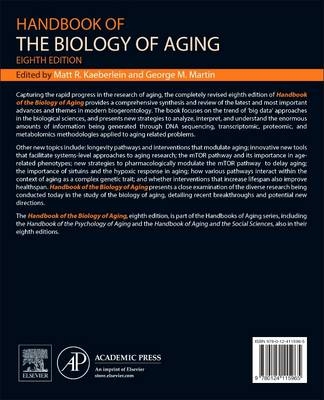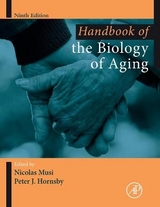
Handbook of the Biology of Aging
Academic Press Inc (Verlag)
978-0-12-411596-5 (ISBN)
- Titel erscheint in neuer Auflage
- Artikel merken
The book includes discussions on longevity pathways and interventions that modulate aging, innovative new tools that facilitate systems-level approaches to aging research, the mTOR pathway and its importance in age-related phenotypes, new strategies to pharmacologically modulate the mTOR pathway to delay aging, the importance of sirtuins and the hypoxic response in aging, and how various pathways interact within the context of aging as a complex genetic trait, amongst others.
Dr. Nicolas Musi is a tenured Professor of Medicine (Division of Geriatrics and Gerontology and Division of Diabetes) and Director of the Barshop Institute for Longevity and Aging Studies, the San Antonio Claude D. Pepper Older Americans Independence Center, and the San Antonio Geriatric Research, Education and Clinical Center. He is an active educator and research mentor, and supervises clinical and research fellows, residents and graduate students. In this role, he also functions as Director of a T32 Training Grant on the Biology of Aging. Dr. Peter Hornsby obtained a Ph.D. in Cell Biology at the Institute of Cancer Research of the University of London. He has held faculty positions at the University of California SanDiego, the Medical College of Georgia, and Baylor College of Medicine. Currently he is Professor in Department of Physiology and Barshop Institute for Longevity and Aging Studies, University of Texas Health Science Center, San Antonio.
Foreword Preface
Section I: Basic Mechanisms of Aging: Models and Systems
Chapter 1 – Longevity as a Complex Genetic Trait George L. Sutphin and Ron Korstanje
Chapter 2 – The mTOR Pathway and Aging Katherine H. Schreiber, Monique N. O’Leary, and Brian K. Kennedy
Chapter 3 – Sirtuins, Healthspan, and Longevity in Mammals William Giblin and David B. Lombard
Chapter 4 – The Hypoxic Response and Aging Scott F. Leiser, Hillary A. Miller, and Matt Kaeberlein
Chapter 5 – The Role of Neurosensory Systems in the Modulation of Aging Michael J. Waterson and Scott D. Pletcher
Chapter 6 – The Naked Mole-Rat: A Resilient Rodent Model of Aging, Longevity, and Healthspan Kaitlyn N. Lewis and Rochelle Buffenstein
Chapter 7 – Contributions of Telomere Biology to Human Age-Related Disease Ting-Lin B. Yang, Shufei Song, and F. Brad Johnson
Chapter 8 – Systems Approaches to Understanding Aging Lei Hou, Dan Wang, Hao Cheng, Bo Xian, and Jing-Dong J. Han
Chapter 9 – Integrative Genomics of Aging João Pedro de Magalhães and Robi Tacutu
Chapter 10 – NIA Interventions Testing Program: A Collaborative Approach for Investigating Interventions to Promote Healthy Aging Nancy L. Nadon, Richard A. Miller, Randy Strong, and David E. Harrison
Chapter 11 – Comparative Biology of Aging: Insights from Long-Lived Rodent Species Michael Van Meter, Vera Gorbunova, and Andrei Seluanov
Section II: The Pathobiology of Human Aging
Chapter 12 – Genetics of Human Aging Miook Cho and Yousin Suh
Chapter 13 – The Aging Arterial Wall Mingyi Wang, Robert E. Monticone, and Edward G. Lakatta
Chapter 14 – Age-Related Alterations in Neural Plasticity Shannon J. Moore and Geoffrey G. Murphy
Chapter 15 – The Aging Immune System: Dysregulation, Compensatory Mechanisms, and Prospects for Intervention Ludmila Müller and Graham Pawelec
Chapter 16 – Vascular Disease in Hutchinson Gilford Progeria Syndrome and Aging: Common Phenotypes and Potential Mechanisms Ingrid A. Harten, Michelle Olive, and Thomas N. Wight
Chapter 17 – Cardiac Aging Dao-Fu Dai, Ying-Ann Chiao, Robert J. Wessells, Rolf Bodmer, Hazel H. Szeto, and Peter S. Rabinovitch
Chapter 18 – Current Status of Research on Trends in Morbidity, Healthy Life Expectancy, and the Compression of Morbidity Eileen M. Cr4immins and Morgan E. Levine
Chapter 19 – On the Compression of Morbidity: From 1980 to 2015 and Beyond James F. Fries
| Reihe/Serie | Handbooks of Aging |
|---|---|
| Verlagsort | San Diego |
| Sprache | englisch |
| Maße | 191 x 235 mm |
| Gewicht | 1160 g |
| Themenwelt | Geisteswissenschaften ► Psychologie |
| Naturwissenschaften ► Biologie ► Genetik / Molekularbiologie | |
| ISBN-10 | 0-12-411596-9 / 0124115969 |
| ISBN-13 | 978-0-12-411596-5 / 9780124115965 |
| Zustand | Neuware |
| Haben Sie eine Frage zum Produkt? |
aus dem Bereich



